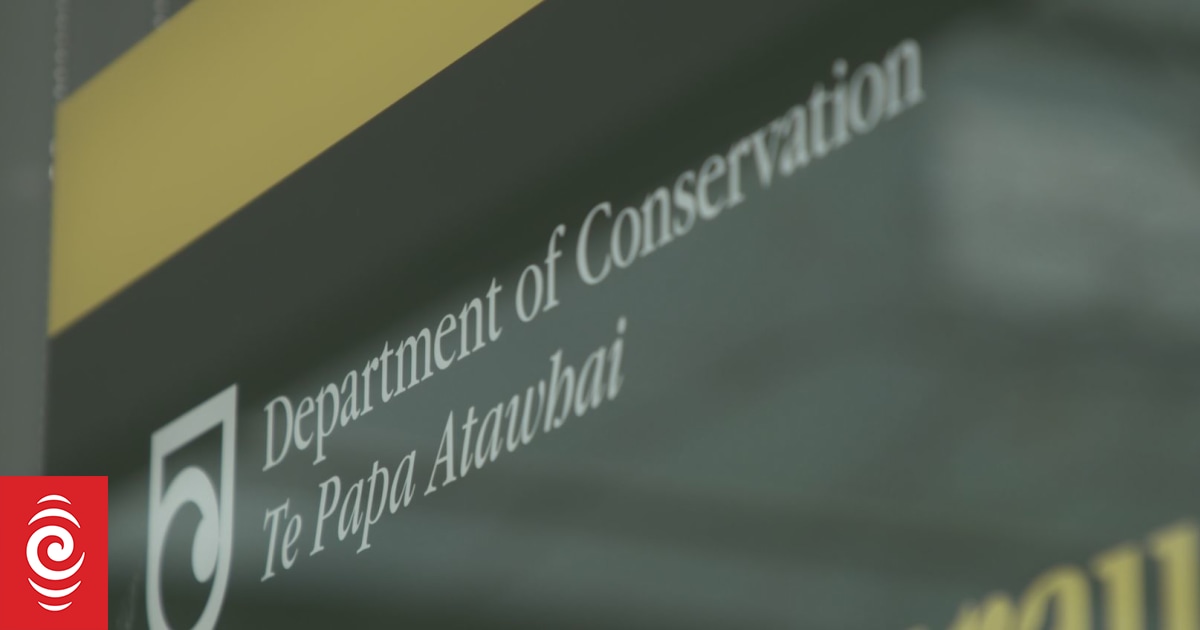Correction: This story has been updated to clarify the 21 percent decrease in DOC’s overall funding is over the period until 2026/27, not this year.
Photo: RNZ/ Nick Monro
The Department of Conservation is cutting 130 roles to meet the government’s demand for a 6.5 percent reduction in spending.
Under the proposed restructure, 270 positions will be disestablished, of which 101 are currently vacant and 140 “new” roles created.
In a statement, the Department of Conservation (DOC) said they were in consultation with staff on the proposals, which they have been working on for the past few months.
“We have tried to find options that would have the least impact overall on people and on conservation outcomes.
“The proposals include a reduction of 130 roles overall, however we expect the impact on people to be less than that because we have been holding a large number of vacancies since November.
“The final number of redundancies won’t be known until we have consulted our people and we have been through a management of change process.”
The proposed cuts by business group are:
- Biodiversity, Heritage and Visitors: 24 net roles to be disestablished
- Office of the Director General: 2 roles to be disestablished
- Organisation Support: 9 net roles to be disestablished
- Policy and Regulatory Services: 22 net roles to be disestablished
- Public Affairs: 18 net roles to be disestablished
- Regional Operations (Support): 54 net roles to be disestablished in a group
- Treaty Relationships: 1 role to be disestablished
The Public Service Association (PSA) slammed the cost-cutting drive as “reckless” at a time when DOC was already struggling to protect the conservation estate.
PSA national secretary Duane Leo said DOC warned incoming Conservation Minister Tama Potaka last year that nature was “in decline and significant habitats and species at risk”.
The briefing pointed out extreme storm events were racking up significant bills and the current network of trails and huts was “not sustainable”.
“That is a cry for help, not cuts. We should be investing more, not less, in such an important agency.
“The government talks a big game about growing the economy yet wants to shackle DOC which plays such an important role in boosting tourism, our second biggest export earner. How does this make any sense?”
In the November 2023 briefing, officials admitted the department was “losing the battle” against predators and invasive species and facing growing threats from extreme weather, climate change and visitor numbers.
“Despite all we are doing to try to protect and restore habitats and assist species, nearly 4000 native species are either at risk or threatened with extinction. When species are lost from New Zealand, they are often lost from the whole world, and many are only holding on in small numbers because of intensive management.”
The current visitor network was “not sustainable” and taking staff and cash from biodiversity efforts, the briefing stated.
It is the latest department to learn its fate as part of the government’s cost cutting measures.
More than 1000 jobs are already set to go across the sector.
If you have been affected by public sector job losses, contact ruth.hill@rnz.co.nz
DOC staff gathered for a meeting to discuss the proposal early Wednesday afternoon.
The 6.5% reduction in spending overall comes on top of a 21 percent fall in funding due to the end of the Jobs for Nature and other time-limited funded programmes.
DOC’s funding overall was due to drop from $880m this year 2023/2024 to $728m in 2026/27.
At the end of last year, DOC employed 2797 people in total.
It was singled out during the election campaign by Finance Minister Nicola Willis as an agency that could make big cuts.
In 2019, tourism on public conservation land and waters provided an economic value of $4.1 billion nationally, accounting for 21 percent of the tourism industry.
“These are blunt cuts which will leave a damaging legacy for years to come as DOC loses experienced people and the money to protect the very thing, we and overseas visitors value so dearly,” PSA national secretary Duane Leo said.
DOC delivers 1080-based predator control on about 7.5 percent of public conservation land annually.
Many of DOC’s 967 backcountry huts were ageing and in poor repair, while the length of track being maintained has grown from 11,000km to 15,000km over the last 14 years.

